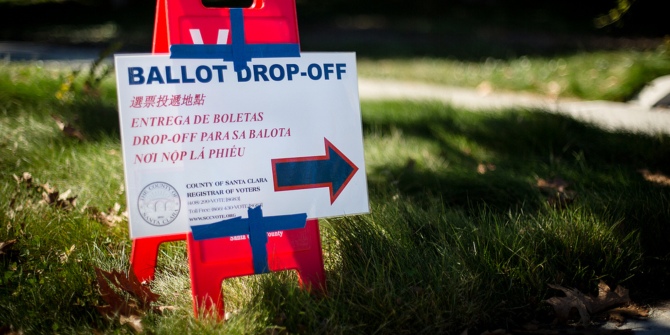On Thursday the United States Supreme Court upheld the subsidies for health insurance exchanges set up by the federal government under the Affordable Care Act. We asked our expert contributors for their reactions to the ruling. We will be periodically updating this post with expert commentary.
-
The King v. Burwell ruling adds pressure on the GOP candidates in the 2016 presidential race – Ling Zhu – University of Houston
-
If nothing else, the decision in King confirms that health reform’s past continues to shape its present. – Philip Rocco – University of Pittsburgh
-
The decision affirming ACA’s existence may cement a two-tier coverage system– Charles Barrilleaux – Florida State University
_____________________________________________
 Ling Zhu is an Assistant Professor of Political Science at the University of Houston.
Ling Zhu is an Assistant Professor of Political Science at the University of Houston.
On Thursday, the Supreme Court ruled on King v. Burwell that the Affordable Care Act allows the federal government to continue providing nationwide tax subsidies to help low- and middle-income Americans purchase health insurance. With the assertive 6-to-3 ruling, the Court made it clear that the Affordable Care Act is here to stay, and that the political effort in destroying the law should be rejected.
The Supreme Court ruling is far more than a legal victory for the Obama Administration. It immediately intensified the early stage of the 2016 presidential race. As the Court decision ends the second major legal sabotage of the ACA, it puts pressure on its GOP opponents to more loudly express their opinions about health care reform. Not surprisingly, GOP hopefuls such as Ted Cruz and Marco Rubio quickly responded to the ruling with their dissent. But now, the political risks of campaigning on taking the ACA away would be ever bigger. According to a New York Times poll, 47 percent of Americans now approve the law, outnumbering the number of opponents (44 percent) for the first time in the five years. The court ruling sustains federal subsidies to thousands of Americans who cannot afford insurance coverage by themselves, many of whom live in states without Medicaid expansion and state-based exchanges. Those who rely on federal subsidies to keep their insurance coverage will not favor the idea of repealing the law.
The bigger problem is that, after numerous unsuccessful attempts to repeal the ACA, the GOP has struggled for five years to come up with an alternative plan. Today, all five Republican presidential candidates have all declared the goal of repealing of the ACA, but most of them have vague alternative plans. Campaigning against the ACA without an unspecified alternative plan would be a losing strategy. The Supreme Court ruling has already made health care reform the first policy test for the 2016 presidential candidates, but much more so for the GOP candidates.
_____________________________________________
If nothing else, the decision in King confirms that health reform’s past continues to shape its present.
 Philip Rocco is a Postdoctoral Associate in the Health Policy Institute at the University of Pittsburgh.
Philip Rocco is a Postdoctoral Associate in the Health Policy Institute at the University of Pittsburgh.
To understand the significance of King v. Burwell, look no further than the economical first sentence in Chief Justice Roberts’ opinion: “The Patient Protection and Affordable Care Act…grew out of a long history of failed health insurance reform.” If nothing else, the decision in King confirms that health reform’s past continues to shape its present.
First and foremost, the history of health reform provided a lens for interpreting the ACA’s ambiguous Section 36B, which established tax credits to the uninsured. By applying the logic of FDA v. Brown & Williamson Tobacco Corp., the Court affirmed its own ability to authoritatively interpret ambiguous statutory language that is of “economical and political significance.” Yet the drafters of 36B left few direct clues about how to resolve the provision’s ambiguity. What existed, instead, was a well-documented legacy of state health reform efforts that resulted in a “death spiral” of higher premiums when they could not attract healthy patients through a combination of a coverage mandate, subsidy, and a guaranteed issue. By contrast, Massachusetts’ 2006 successful health reform effort included each of these provisions. Members of Congress, the Court reasoned, could not have been blind to this history when they wrote the ACA, which “adopts a version of the three key reforms that made the Massachusetts system successful.”
Historical legacies also shaped the high-stakes context in which King was decided, as my research with Daniel Béland and Alex Waddan suggests. Since few states had extensive pre-existing capacities to house or build exchanges, proponents of state-based exchanges had to assemble coalitions to create policies from scratch, and faced a barrage of veto points when doing so. The effect, as the Court recognized, was that consumers in more than half the states would lose subsidies, and few states would take action to create an exchange in the event that tax credits were struck down.
While King settles the question of subsidies, we have not seen the last of challenges to health reform—legal, political, or technological. How policymakers, including judges, respond to these challenges and shape the future of health reform will depend on what they know about its history.
_____________________________________________
The decision affirming ACA’s existence may cement a two-tier coverage system
 Charles Barrilleaux is the LeRoy Collins Professor of Political Science at Florida State University.
Charles Barrilleaux is the LeRoy Collins Professor of Political Science at Florida State University.
The US Supreme Court’s decision in King, et al. v. Burwell, Secretary of Health and Human Services, et al. (2015) (largely known as King v. Burwell) secures the status of the 2010 Patient Protection and Affordable Care Act (ACA) as functioning public policy. The Court’s 6-3 decision is based on the policy’s legislative intent, with Chief Justice John Roberts’s majority opinion concluding that Congress wrote the act to improve health insurance markets, and if possible “…we must interpret the Act in a way that is consistent with the former, and avoids the latter.”
The ACA has now survived two challenges to its legality, one decided by the Supreme Court in 2012, and the King v. Burwell decision. The 2012 decision was a partial victory for the defense: the Court ruled that the Act was legal but weakened it by ruling that states can not be compelled to adopt expanded Medicaid as a means for providing coverage for more low income people. The King v. Burwell decision affirming ACA’s existence may cement a two-tier coverage system that has evolved due to some state governments’ refusal to expand Medicaid. As of June 2015, 28 states have expanded Medicaid, 1 is seeking permission to expand under a revised form of Medicaid, and 21 have not expanded Medicaid. Most of the 21 states that are not expanding Medicaid are opposed to it, on mainly partisan grounds, and their refusals have important consequences for their residents.
The ACA has succeeded in reducing the number of people aged 18-64 without health insurance. That is less true for states without the Medicaid expansion, but the ACA is working there as well, as insurance coverage has expanded nationwide. It appears as if the ACA will be “safe” through the end of the Obama presidency. Several GOP presidential candidates promise to do away with it upon their election. One candidate, Ted Cruz, enrolled his family in an ACA program upon his decision to seek the presidency, but promises to do away with Obamacare when elected. Another, Marco Rubio, promises to replace the ACA with his plan. His voluntary private plan, Florida Health Choices, is now operating in that state with $2.5 million seed funding provided by that state’s legislature in 2008. In April, 2015 it had 80 enrollees. The ACA addresses the biggest problems of health insurance by not allowing companies to select to cover on the most-healthy people and by forcing people to enroll. It is not clear how the various private plans that Obamacare critics tout will avoid those difficulties.
The ACA’s demise seems unlikely. Its critics have spent six years trying to dismantle it, without success, and none have credible plans to replace it. The GOP governors who refuse to expand the program have no solution to their states’ having the highest percentages of people without insurance in the nation and appear to embrace that as a sign of fiscal prudence. The presidential candidates do not have coherent plans, for the most part, and those who plan to depend on voluntary enrollments will find those do not provide affordable insurance. Perhaps most importantly, disrupting the ACA will disrupt health insurance markets nationwide and that would be a disastrous outcome for any political party. A decision contrary to Thursday’s may have destroyed Obamacare; the Court instead secured its existence.
_____________________________________________
Featured image credit: Ted Eytan (Flickr, CC-BY-SA-2.0)
Please read our comments policy before commenting.
Note: This article gives the views of the author, and not the position of USApp– American Politics and Policy, nor of the London School of Economics.
Shortened URL for this post: http://bit.ly/ObamacareSC






